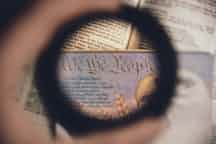"The body of people … do not possess the discernment and stability necessary for systematic government. To deny that they are frequently led into the grossest errors by misinformation and passion, would be a flattery which their
own good sense must despise." --Alexander Hamilton.
The election of Donald Trump as President should be seen as part of a larger phenomenon: a war on the Enlightenment. The U.S. Constitution is often cited as an elegant repository of Enlightenment thinking.
In the late 1780s Americans were inventing the modern world’s first democracy amidst a chorus of international scorn. Yes, the Americans had defeated the British (with the help of the French), but their idea of creating a democracy was too absurd for words. It was a foregone conclusion in Europe that this ridiculous experiment by the Americans would end in disaster. Without the firm hand of a monarch, or at least a government run by aristocrats, "the people" were sure to make a hash of things. It was inevitable, they believed, that a tyrant would soon be running things in America—either a tyrant who seized power during the anarchy that was sure to come, or just as likely a tyrant elected by the people themselves.
Back in America, some of the Founding Fathers were not a whole lot more optimistic. During debates at the New York State Ratifying Convention in 1788, a delegate argued that, were it only possible, pure democracy (that is, direct democracy in which every enfranchised citizen votes on every issue) would be the most perfect government of all.
DO AMERICANS HAVE 'DISCERNMENT AND STABILITY'?
Alexander Hamilton could hardly believe his ears! He immediately sought recognition and said, no doubt with some heat: "The body of people … do not possess the discernment and stability necessary for systematic government. To deny that they are frequently led into the grossest errors by misinformation and passion, would be a flattery which their own good sense must despise."
Talk about a back-handed compliment! "Our people are so smart," he seemed to be saying, that "they would be terribly offended if anyone suggested they had ‘the discernment and stability necessary for systematic government.’"
This was not meant to be a slur on the electorate, but a recognition of the fact that the only kind of democracy with a chance at success was one in which the people freely determined who would represent them in the government, and then left it up to those representatives to make wise and informed choices for them.
But could the people be counted on to elect the wisest among them? Lurking behind all the debates in Philadelphia was the core question, as framed by Hamilton: "[Do] the body of people … possess the discernment and stability necessary for systematic government?"
Ultimately, the founders groped their way to a compromise. "Let’s have enough faith in the people," they reasoned, "to let them directly elect their representatives to the lower house of Congress, the House of Representatives. But let’s draw the line there by creating an upper house of Congress, the Senate, whose members will serve six year terms rather than two, and who will be elected by each state’s legislature rather than directly by the people." Pennsylvania’s Gouverneur Morris wanted to go further by choosing senators for life. Why did the Founders feel so strongly about insulating senators from direct popular vote? As one convention delegate put it, the Senate’s most important role would be "to correct the prejudices, check the intemperate passions, and regulate the fluctuations of [the] popular assembly."
Reflecting the fluctuations and intemperate passions of the people, then, would be the job of the House of Representatives. Not foreseeing cable TV and public opinion polls, the Founders could not have known how wildly successful the House of Representatives would be in its assigned role.
It comes as a surprise to many, but the Constitution did, in fact, prescribe that senators be elected by state legislatures rather than by popular vote. This was only changed in 1913 with adoption of the 17th amendment.
(The institution of the Electoral College, which so dumbfounds the entire world, is also an echo of the Founders’ concerns over popular democracy. The president was to be elected by an Electoral College whose members would be chosen by each state legislature—not by a popular vote. Technically speaking, it is still the Electoral College that elects the president, but the College’s vote today is merely a ratification of the popular vote.)
TO US, AN ELITIST SOUND
The new government that Americans were creating during the 1780s seemed radically democratic to the rest of the world; yet to our own ears the debates sound distinctly elitist. Is it just possible they may have known some things we have forgotten?
The Founding Fathers were among the most intelligent and widely read men in the world. (It would be many decades before women would be given the chance to get an education and join the public debate.) And what they focused on most were the histories of Greece and Rome, histories they read in the original Greek and Latin, from books in their own libraries.
What they found in these histories gave them great pause. It seemed to be a kind of law of history that governments began as monarchies or dictatorships, which in some cases evolved into democracies. The problem was that democracies would ultimately devolve into mob rule, which brought back—what else?—kings and dictators to restore order. The Founders saw their job as threading the needle between liberty and order.
"The history of ancient and modern republics has taught [us]… that popular assemblies are frequently misguided by ignorance, by sudden impulses and [by] the intrigues of ambitious men," said Hamilton. And it wasn’t just Hamilton who was worried about "too much" democracy. His fears, to one degree or another, were shared by all the delegates in Philadelphia.
Thomas Jefferson was in Paris as minister to France while the Constitutional Convention met in Philadelphia. When he received a draft of the Constitution, he thought the delegates in Philadelphia had gone a little too far in isolating the Senate from direct popular control. He didn’t quarrel with the idea of senators being selected by state legislatures rather than by popular vote, but he thought a six year term might be too long. Over the years, though, as he experienced the rough and tumble of politics and government, he came to see the wisdom in six-year terms to create a "wise and steady body."
Washington once compared the House and Senate to a tea cup and saucer. The House was the cup, holding the hot tea; the Senate was the saucer into which the tea would be poured. But the tea would not be consumed until it had spent enough time in the saucer to cool off.
Running through the debates in the Constitutional Convention, was the concern, expressed over and over, that the greatest danger the new nation faced was "mobocracy." "I see with fear and trembling," said Gouverneur Morris, "that [we may be] under the worst of all possible dominions … the dominion of a riotous mob." This is why he wanted not only senators but the president to be elected for life—to insulate them from the shifting moods of a populace driven by demagogues.
After the Convention completed its business, a citizen asked Benjamin Franklin what kind of government the delegates had devised for the people. “A republic,” he replied, “if you can keep it.”
COULD AMERICANS DO IT?
Ezra Sampson was a moderate Federalist who lived in Concord, Mass. He thought it was still an open question, a decade and a half after the Constitution was adopted, whether Americans would prove themselves up to the task of self-government. Writing in 1805 he said the biggest challenge would be—as it had been throughout history—for the masses to resist the siren calls of demagogues. History has shown time and again, he said, that "the people may, with their own hands, rive out wisdom and virtue from almost every place of influence and authority, and replace them with folly and wickedness."
In words that anticipate Lincoln’s address at Gettysburg 60 years later, Sampson said:
"The great and all-important experiment is now [underway], whether the people of our nation be wiser than have been the people of other nations and of former ages. God grant that the experiment may prove successful…."
But it wouldn’t be easy. Americans needed no encouragement to acknowledge that kings can do wrong. But, Sampson warned, "The same wholesome truth should be inculcated on the people, when they are the fountain of power."
But who’s going to be brave enough to tell the people they are being led by demagogues? The people, after all, “are the fountain of power" and, as Sampson suggests, are about as likely to respond well to criticism as the kings they replaced. Meantime, the demagogues will "flatter" the people and will "[forever be] proclaiming their patriotism."
Sampson paraphrased Joseph Priestly, who saw a kind of Catch-22 inherent in democracies: "In general, the truly honest Statesman is sure to be abused, and generally ruined by the arts of the dishonest, who scruple not to fight with such weapons as the upright man cannot use himself …."
And don’t even think that mankind will ever get wise to this, said Sampson. Human nature never changes, and when demagogues sound their trumpet and appeal to man’s ignorance and selfishness, well, the multitudes will be hooked every time:
"Men, like fishes -- provided the hook is concealed -- greedily swallow the bait: and, as fishes … are still caught with the same ease as formerly. So the heedless children of men profit but little from the history and experience of former generations; insomuch that the same arts of deception, which have succeeded in one age, may be practiced in the age ensuing, with equal success."
Perhaps, said Sampson, America’s democracy will succeed, if Jefferson’s predictions about the virtue and education of the common man come true. "But, on the other hand," he said, "if the sources of public information should be corrupted; if newspapers should become the vehicles of falsehood and slander …;—if the education of children and youth should be neglected;—if there should be a general depravation of morals;…—if patriotism itself should become a bye-word, by reason of the conduct of its hypocritical professors …: If this should be the state of things … it would but too seriously indicate approaching ruin.”
ENTER JEFFERSON
Wasn’t there anyone sanguine about the wisdom of the masses? When people think of champions of the common man, Thomas Jefferson is usually the first name that comes to mind.
"I have no fear," he said in 1787, "but that the result of our experiment will be, that men may be trusted to govern themselves without a master." This was so fundamental in Jefferson’s worldview that he added this remarkable sentence: "Could the contrary of this be proved, I should conclude either that there is no God, or that he is a malevolent being." That’s pretty high stakes—and a moving affirmation of his belief that mankind not only has the right to govern itself, but the ability.
And yet ….
There were qualifications attached to this optimism, and Jefferson over time became less optimistic about man’s capabilities for self-government. Toward the end of his life, he had to acknowledge that "The qualifications for self-government in society are not innate. They are the result of habit and long training."
Jefferson came to believe it would be an uphill climb—even in America—for a people to develop the "habits and long training" necessary for democracy to succeed. In the meantime—while Americans were the people in all the world best prepared for democracy—success would not be guaranteed unless a few basic conditions were met:
First, the people must not succumb to what we would today call materialism. Luxuries corrupt the soul and degrade the body politic. This viewpoint was held by virtually every literate American.
Second, Americans must maintain their Virtue; they can’t collapse into endless factions looking only to their own welfare—they have to think in terms of the common good—including sacrifice for the welfare of future generations. (No one took this for granted. Maybe he was just having a bad day, but one of the great proponents of the Enlightenment in America, Benjamin Rush, wrote John Adams in 1789, that "a hundred years hence, absolute monarchy will probably be rendered necessary in our country by the corruption of the people.")
Most of all, the electorate has to be educated and informed. "The people will err sometimes," but "when things get too far wrong as to attract their notice, they may be relied on to set them to rights—if they are well-informed."
Jefferson never saw anything so important to the success of the American experiment as education.
- "Education is the true corrective of abuses of constitutional power."
- "I have two great measures at heart, without which no republic can maintain itself in strength [and the first is] that of general education, to enable every man to judge for himself what will secure or endanger his freedom."
- "If the condition of man is to be progressively ameliorated, … education is to be the chief instrument in effecting it…."
And finally, in what is one of the most beautiful evocations of his enlightened and hopeful outlook, he said :
- "Enlighten the people generally, and tyranny and oppressions of body and mind will vanish like spirits at the dawn of day."
WANTED: AN ENLIGHTENED COUNTRY
Jefferson thought there were four bedrock necessities if America’s experiment with democracy was to succeed:
(1) An educated, informed electorate.
(2) A virtuous electorate, uncorrupted by luxuries and materialism.
(3) An electorate willing to sacrifice for the common good, and unwilling to pass its problems on to the next generation.
(4) An electorate discerning enough to resist demagogues. In short, an enlightened country that would be "admired and respected by every people on earth."
If you think that’s an accurate description of America today, then the Founders’ concerns were ill-founded. If you don’t think that’s an accurate description of America today, then perhaps it’s time, for a change, to seriously contemplate what the Founders had to say about human nature and the frailty of democracies.
It is said that when Henry Kissinger asked the premier of China what he thought of the French Revolution, the premier’s reply was: "I don’t know. It’s too soon to say." The same might be said of the American Revolution.
-end-




